NAI DEOS 68PPC2 QUICKSTART
Edit this on GitLab
NAI DEOS 68PPC2 QUICKSTART
1. REQUIRED TOOLS
-
DDC-I Open Arbor DDS
-
NAI Software Support Kit (SSK)
-
Terminal Emulator (TeraTerm, Putty, etc.) setup for 115,200 Baud Rate, 8 Data Bits, 1 Stop Bits, no parity.
2. NAI SOFTWARE SUPPORT KIT DESCRIPTION
-
This North Atlantic Industries SSK release contains three folders, one labeled base which contains the NAI libraries, another labeled deos_jupiter and deos_jupiter_653. These folders contain fully configured workspace containing project files that link to the source code in the base folder for both Deos RMA and Deos 653. Below is an overview of the projects available in the deos_jupiter folder.
Project Name |
Description (Listed in order of recommended build order) |
naibsp |
Defines interface driver code, handles OS and processor specific routines |
naibsp_sys |
Defines higher level interface routines for handling read/write access and control |
naibsp_dev |
Defines NAI end point device driver code (e.g., EEPROM, FRAM, LED) |
nailib |
Defines common utility routines used by other NAI libraries |
naiether |
Defines NAI ethernet protocol to handle NAI commands over ethernet |
naiif |
Defines higher level interface routines for interfaces not covered by naibsp_sys |
naidev |
Defines higher level NAI device routines, abstracts device driver code |
naibrd |
Defines NAI routines for configuring boards and modules |
naiapp_common Defines utility routines used by NAI sample applications |
naiapp_mod_* NAI Sample application programs for the modules included in this shipment |
3. BUILDING DEOS BSP PACKAGE IN OPENARBOR
-
Launch OpenArbor
-
Select the deos_jupiter/$platform-name directory in the location of the SSK.
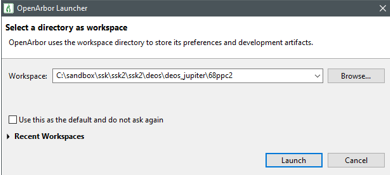
-
Once the workspace has been selected, the following projects should be made available to build in the DDCI-Project Window. It is recommended the build order follow the table entries described earlier.

-
Building the nai68ppc2Uboot platform project will generate a hypstart.bin file which contains the kernel, configuration files and application code that will be loaded onto the 68PPC2 single board computer.
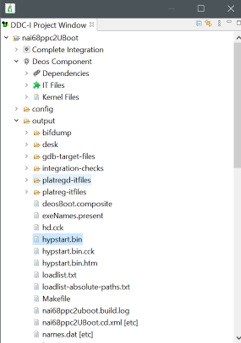
4. RUNNING OTHER SAMPLE APPLICATIONS IN OPENARBOR
By default, the naiapp_mod_ar429_loopback sample application is set to run by default. To run any of the other included NAI sample applications, the Deos image need to be rebuilt and reloaded.
-
Go to the platform project nai68ppc2Uboot and navigate to Deos Component → Dependencies. Right-click on the current dependent application and remove it.
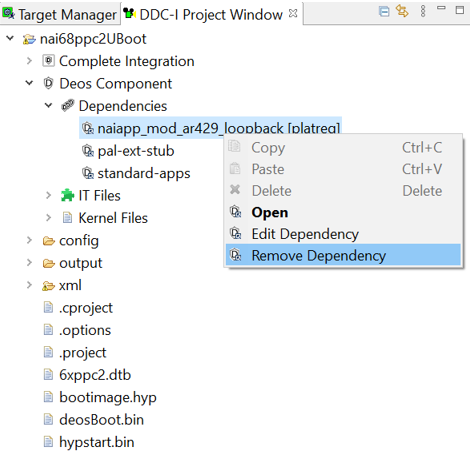
-
Take the project of the application you now want to include to run with the Deos image and drag it to the nai68ppc2Uboot Platform project.
-
The Edit Dependency window should appear. Add this dependency to the platreg.
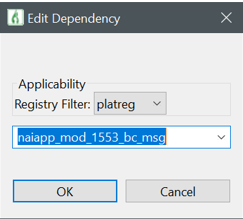
-
Build all projects.
-
In the Target Manager add a connection for the 68PPC2.
-
Launch the Status Monitor or the Video Stream.
-
Right-click the Status Monitor or Video Stream and click Update Target Load. Make sure End up in registry is set to platreg if that is where application dependency is. Make sure Force Cold Start is check
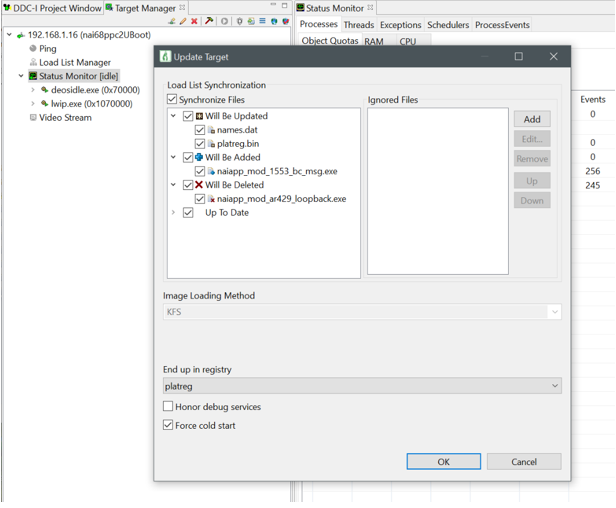
-
Deos should now cold start and the new application should be running.
5. CHANGING BOARD IP ADDRESS
-
OpenArbor stores information about the platform’s IP address in the lwip.config file.
-
Navigate to the platform project nai68ppc2Uboot → config → lwip.config
-
Change the IP address on the following line:
interface=dtsec:2,1,FMANV3 DHCP 192.168.1.16 255.255.255.0
-
More information can be found in the Deos NAI68PPC2 BSP User Guide.
6. SPEEDING UP THE PLATFORM BUILD
To speed up builds and avoid building libraries that should not need to be modified during application development, we can follow a couple steps to point Open Arbor to the location of our built binaries.
-
Open OpenArbor and build all NAI libraries.
-
Open a Windows PowerShell instance and run the script named consolidate-desk-tree-for-packaging.ps1. This will copy the parts of the “desk tree” in the output directory to a common location that OpenArbor can be pointed to look at.
-
In OpenArbor navigate to Window → Preferences → DDC-I → Deos Search Path
-
Click ‘Add'. Change Preference Scope to This Workspace Only and browse to the path that the Power Shell script created: /SSK_Release/deos_jupiter/built-binaries/desk
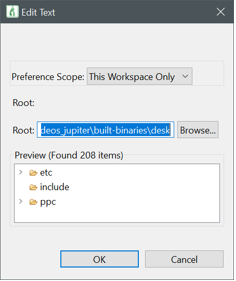
-
Hit OK
-
Now, if you would like to skip building the NAI libraries you can “Close Project” on any applicable libraries that have been copied. OpenArbor will check the search path to see if it has binaries for those libraries and use them instead.
-
If you need to debug any NAI libraries or want to navigate source, open up the projects.
7. FURTHER HELP
-
Additional API library documentation is available in the documentation folder of the NAI library package
-
Additional Deos documentation regarding 68PPC2 can be found in the NAI68PPC2 BSP User Guide included in your DDC-I OpenArbor installation.
8. KNOWN ISSUES
Issue: DDC-I’s OpenArbor IDE sometimes will delete NAI’s source folders in a given project, because they are “linked resource” folders. This change can be seen in the .project file with the removal of the <linkedResources> element. Solution: Revert the .project file for the affected project.
Issue: The OpenArbor Parallelized Builds feature can often cause workspaces not to build. Solution: Fixed in OpenArbor version 8.6.7
